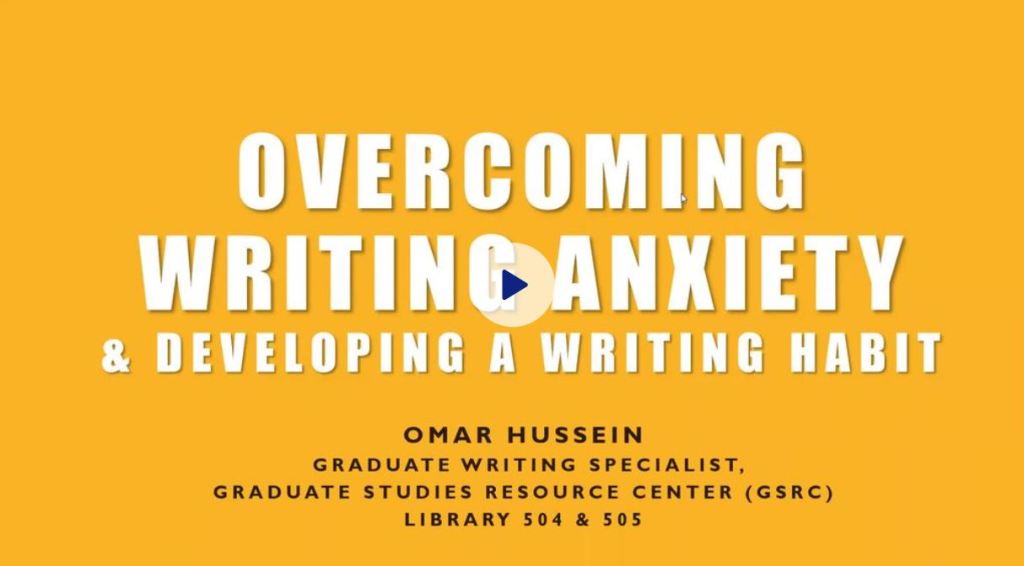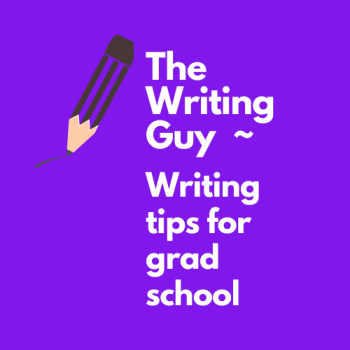One of the most common problems that people deal with is having negative feelings associated with the writing process. I say “people” rather than “grad students” because this problem is extremely common. It affects not only students at all levels (from elementary school to the PhD) but also faculty, academic staff, and working professionals. Paradoxically, this can be good news: it means that, if you’re having a rough time getting your writing done, or with simply getting started, you’re not alone, and there’s nothing wrong with you.
But the bad news is that writing is just difficult, at least for most people most of the time, and it can elicit all kinds of negative emotions, ranging from annoyance, frustration, and self-doubt to keyboard-smashing anger and hair-pulling despair. Fortunately, there are some powerful tools to rein in these negative emotions and start developing a less dramatic, and more productive, relationship with writing. And I’m going to share some of these tools with you right now on this page.
Defining the problem
First, let’s identify the problem. I’m using the term “writing anxiety,” but there are many other terms for the same problem (or, more accurately, set of problems). The most common term is “writer’s block,” but there are others like “writing apprehension,” “composition anxiety,” “resistance” (Steven Pressfield’s term), and many more. I list some of them in my presentations (below). But our goal here is not to dwell on the problem, but to solve it. Suffice it to say that “writing anxiety” is a cover-all term for any negative and/or exaggerated emotions that make it difficult to start, continue, or finish your writing projects.
Overcoming writing anxiety: The CBT approach
Over the past few years, I’ve become impressed with the effectiveness of cognitive behavioral therapy (CBT) in helping academic writers overcome their writing related fears, frustrations, and anxieties. CBT is based on the work of psychologists like Albert Ellis, Aaron Beck, and David Burns, and it is highly effective for dealing with “mood disorders,” like depression, stress, and anxiety, in general. So, the bulk of my current materials is based on CBT principles.
**DISCLAIMER: I am not a licensed mental health professional. I am an academic support professional with a keen interest in psychology (among other topics), but nothing that I say here should be construed as professional medical advice.** (you were warned!)
That said, in addition to being one of the most scientifically well-studied approaches to psychological treatment, CBT has been shown by a number of studies to be highly effective as a method of self-help and “bibliotherapy” (book-based therapy; see, for example, the study by Gualano et al., 2017). That’s why I recommend it enthusiastically for people struggling with writing anxiety.
For a detailed explanation, please see my presentation below:
Note on sources: The bulk of the CBT materials in the slides above and the video below are based on David Burns’s “TEAM CBT” model (e.g., the “magic button” is one of Burns’s signature methods). For more information on David Burns’s TEAM CBT, I strongly encourage you to visit his website: FeelingGood.com.
Accompanying packet
When I deliver this presentation live on the CSULB campus, I use photocopies of the following packet. This packet is intended for personal educational use only. The presentation references the packet in a few places, so readers should consult both.
The packet includes and/or cites material from the following sources:
- Burns, D. (1980). Feeling good: The new mood therapy. Harper.
- Burns, D. (1999). The Feeling Good Handbook. Penguin.
- Kelly, J. D. (2016). Perfectionism—the foe of happiness.
- Pennsylvania Child Resource Center. (2017). Thinking about thinking: Patterns of cognitive distortions.
I am encouraging interested readers to check out the original sources for further information. In the case of the longer works (e.g. the books by David Burns), I highly recommend buying or borrowing a copy–they’re well worth the read.
Finally, I take full responsibility for any errors in my presentation or in my framing of the work of others.
Video: CBT for Writing Anxiety “Crash Course” (39 min)
This short(er) video was originally recorded for one of Dr. Maria Claver’s classes, but it was also designed to be “general purpose” so I could post it on this page. It goes over some of the basic principles of David Burns’s CBT (as I understand them–any errors or omissions are mine), and shows how you can apply them to your academic concerns, including writer’s block or writing anxiety. It works like an interactive workshop–you can pause the video at key points to write down your thoughts or complete the described exercises. You can stream or download the video by clicking on the image below:

You can also download the slides here:
Finally, you can download the accompanying cognitive distortions handout here:
Video: Workshop Recording (84 min)
You can view or download a recording of my Workshop on Overcoming Writing Anxiety (recorded Nov 11, 2023) by clicking on the image below:

Note: The browser plays a 1-hour preview. For videos longer than 1 hour, download the file and watch it from your computer (Steps: 1. Click on the video to open the Dropbox video page. 2. Use the “download” button, usually located on the top left of the page).
Video: Workshop Recording (72 min)
You can also watch a recording of an earlier delivery of the same workshop (from Nov 9, 2020) here or by clicking on the image below:

Note: The browser plays a 1-hour preview. For videos longer than 1 hour, download the file and watch it from your computer (Steps: 1. Click on the video to open the Dropbox video page. 2. Use the “download” button, usually located on the top left of the page).
Another Helpful Resource: Succeeding at the Beach
As part of my work as the Graduate Writing Specialist at CSULB, I helped put together a collection of articles on succeeding during graduate school: “Succeeding at the Beach” (part of Navigating Grad Studies at the Beach). The advice on these pages was written for grad students, but much of the content might be helpful to anyone in academia.
In particular, I wrote a three-part series on succeeding in graduate school. Part 2 focuses specifically on mental health. You can access all three via the links below:
Succeeding in Grad School, Part 1: Learning and Studying Remotely
Discusses ways of handling “Zoom fatigue” and other aspects of video conferencing and studying online.
Succeeding in Grad School, Part 2: Maintaining Mental Health
Covers the basics of “feeling good” using cognitive behavioral therapy (CBT) self-help.
Succeeding in Grad School, Part 3: Cognitive and Metacognitive Learning Strategies
Focuses on metacognitive learning strategies for excelling in your coursework
Old (non-CBT) version of the presentation
Below you can find an earlier version of this presentation that DID NOT incorporate CBT methods. It nevertheless offers excellent writing advice and encouragement from a less therapeutic standpoint. Judge for yourself:
Other helpful materials
Virginia Valian: The psychologist and writer Virginia Valian has some excellent essays on writing on her site: Here are direct links to her pieces: “Learning to Work” (1977) and “Solving a Work Problem” (1985).
Anne Lamott: Hands down, one of the best and most important pieces on writing I’ve ever encountered is Lamott’s “Shitty First Drafts” from her book Bird by Bird (1994).
Steven Pressfield: There are only a handful of books that I can honestly say “changed my life,” and Pressfield’s The War of Art (2002) is one of them [Feeling Good (1980) by David Burns, already discussed above, is another]. Pressfield’s book will give you that kick in the seat of the pants that you need to stop whining and start writing.
The Perfectionist’s Script for Self-Defeat: This 1986 Psychology Today article by David Burns is still highly relevant–especially regarding writing anxiety. You can find it freely available online or by clicking the download link below:
